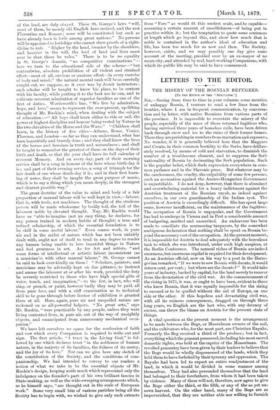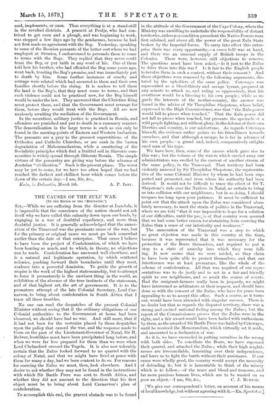LETTERS TO THE EDITOR:
THE MISERY OF THE BOSNIAN REFUGEES.
[TO THE EDITOR OF THE SPECTATOR:]
Sin,—Seeing from time to time in your columns some mention of unhappy Bosnia, I venture to send a few lines from the frontier, where I am in frequent communication, by converea- tion and by letter, with native Bosnians frem various pasts of the province. It is impossible to overstate the misery of• the people, especially of the mass of those returned fugitives who, having survived three years of homeless exile, have been driven back through snow and ice to the ruins of their former homes. There they are perishing in numbers from starvation and exposure. No wonder, if it is generally believed here that the Magyars and Croats, in their common hostility to the Serbs, have deliber- ately resolved, by means of cold and starvation, to diminish the number of a troublesome element, and to suppress the Serb nationality of Bosnia by decimating the Serb population. Such is the popular belief, which finds expression everywhere in com- mon parlance and in the Slavonic press. But whatever may be the carelessness, the cruelty, the culpability of some few persons, such an accusation against the Austro-Hungarian Government is unjustifiable. I do not deny, however, that there is abundant and overwhelming material for a heavy indictment against the Austrian treatment of the Bosnian rayah, as indeed against ourselves, in our own guardianship of the Indian ryot. The position of Austria is exceedingly difficult. She has spent large sums, however insufficient, on the maintenance of the fugitives. The occupation of Bosnia is unpopular, and the Government has had to undergo in Vienna and in Pest a considerable amount of badgering, merited and unmerited. An endeavour has been made to conciliate the murmuring taxpayers, by the somewhat ambiguous declaration that nothing shall be spent on Bosnia be- yond the necessary cost of the occupation. At the presentmoment. it is impossible for Austria to deal adequately with the herculean task to which she was introduced, under such high auspices, at the Berlin Conference. The natural riches of Bosnia are indeed enormous, but enormous capital is required for their development. As an Austrian official, now on his way to a post in the Herze- govina remarked, "If we were to sow Bosnia with ducats, it would return cent, per cent. ; but where are the ducats F " It would take years of industry, backed by capital, for the land merely to recover from the devastation of the civil war. At the commencement of the rising in 1875, it was, or ought to have been, evident to those whG knew Bosnia, that it was equally impossible for the rising to succeed or to be quelled without the aid of Europe, on one side or the other. If this hopeless and devastating civil war, with all its ruinous consequences, dragged on through three long years, we English are the last who, with any decency of excuse, can throw the blame on Austria for the present state of things.
A vital question at the present moment is the arrangement to be made between the Begs, or Mussulman owners of the soil, and the cultivators who, for the most part, are Christian Rayahs. Formerly the Beg received a third of the produce ; but in fact, everything which the peasant possessed, including his most sacred domestic rights, was held at the caprice of the Mussulman. •The revolted peasantry have been given by their leaders to believe that the Begs would be wholly dispossessed of the lands, which they held them to have forfeited by their tyranny and oppression. The Rayahs had been led to expect an entire readjustment of the land, in which it would be divided in some manner among themselves. They had also persuaded themselves that the land had belonged to their forefathers, from whom it had been taken by violence. Many of them will not, therefore, now agree to give the Begs either the third, or the fifth, or any of the as yet nn- sown harvest. On the other hand, many of the Begs are so impoverished, that they are neither able nor willing to furnish
seed, implements, or oxen. Thus everything is at a stand-still in the revolted districts. A peasant at Peulje, who had con- trived to get oxen and a plough, and was beginning to work, was stopped a few days ago by the gendarmes, because he had not first made an agreement with the Beg. Yesterday, speaking to some of the Bosnian peasants of the better sort whom we had employed at Strmica, I endeavoured to persuade them to come to terms with the Begs. They replied that they never could trust the Beg, or put faith in any word of his. One of them told how his brother, who had offended the Beg some years ago, went back, trusting the Beg's promise, and was immediately put to death by him. Some further instances of cruelty and outrage were related which had occurred to them and their own families shortly before the rising. It is useless to tell them the land is the Beg's, that they must come to terms, and that such violence could not be practised now, for the Beg himself would be under the law. They answered that the Christian King must protect them, and that the Government must arrange for them, before they would treat with the Begs. All are now anxiously awaiting the mediation of the Government.
In the meantime, military justice is practised in Bosnia, and offenders are punished and put to death in a summary manner. The demoralisation in the large towns is such as can only be found in the meeting-points of Eastern and Western barbarism. The peasants are a prey to the grossest superstitions of the Orthodox and Catholic Churches, or are sunk in the barren degradation of Mahommedanism, while a smattering of the Socialistic principles which find a fruitful soil in Slavonic com- munities is widely spread through illiterate Bosnia. The simple virtues of the peasantry are giving way before the advance of Austrian "civilisation." Such is the present phase. The worst may be yet to come, for we have too often hoped that we had reached the darkest and chilliest hour which comes before the dawn of the certain day.—I am, Sir, &c.,
Kula, in, Dalmatia, March 5th. A. P. IRBY.



































 Previous page
Previous page